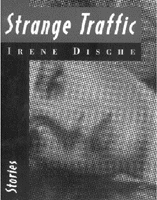

[ Metro | Metroactive Central ]
From the Outsider

Exile and displacementin the stories of Irene Dische
By Jordan Elgrably
If writers are often outsiders who feel the need to stand on the margins of society looking in, expatriate authors are their literal counterparts. Living and working in another culture, these self-exiles throw new light on their native land even as they explore life abroad. James Joyce and Samuel Beckett are exemplary of the estranged writer: Joyce composed English prose with a unique cadence and point of view, forever influencing modern fiction, while Beckett wrote in French to avoid the banalities of his own language.
Irene Dische is an American born and raised in New York's Washington Heights district. Her parents were Viennese Jews, and the neighborhood was home to so many German Jews that it was known as "the Fourth Reich." That German Jews would refer to their new surroundings in this way explains, in part, Dische's unusual world view, which sees isolated individuals living in a shadow realm of confounded cultural identities.
The stories in Strange Traffic are mostly set in Berlin, where Dische has lived continuously since 1980. A few take place in New York, but most of her characters are Germans, Jews or both. After studying anthropology, then German history and literature at Harvard, Dische first went to Germany as a research assistant to reporter Jane Kramer, who was putting together a feature story for The New Yorker. She made friends and eventually settled there with her husband and two children. Her plan was to write a novel about Germany.
Dische's first book, Pious Secrets, achieved considerable acclaim both in Germany and throughout Europe, where it was translated into 15 languages. The short story "Strange Traffic" was included in that novel, and in press notes accompanying her new collection, Dische notes that it "was really the cause of the book's success. The story is about Jews in Germany and America, which was a very touchy subject."
In "Strange Traffic," Charles Allen, the son of a man converted to Judaism, travels to Berlin from Oregon to claim his inheritance. His conflicted feelings for Esther Becker, who seems to him to epitomize his idea of the German Jewess, implode when he learns she is the daughter of a Nazi who converted to Judaism for profit.
In Esther, Dische has created a Jewish character that Germans can--ironically--love to loathe. She is mysterious, money-grubbing and lacks class, decorating her flat with plastic tables. "Ghastly, isn't it?" she asks. "We Jews have no taste. I read an article once on why. It comes from generations always having to move on. We don't form attachments to furniture."
Dische depicts the Jewish characters in Strange Traffic with all their foibles and contradictions, allowing them to be real people, not idealized models. None of them, however, is in any way remarkable or even particularly headstrong or spirited. Dische's Germans aren't very flattering either. Some of her characters are antiheroes who struggle with ambivalence; others come off as likable eccentrics.
The impulse to mole beneath the surface of another culture has prompted many American writers to live abroad, but few remain for as long as Dische has. Something happens to a writer's use of English after living outside his or her community of collective memory; the rhythms and idiosyncrasies of the second language exert a subtle yet powerful influence over the first.
Dische's English prose is often strange, her syntax lending itself to her mild satirical tone. Hence, she writes, "the chauffeur had left the car turned on," or "the baggage clerk had seen his American passport and bedlam broke out among his prejudices." The occasionally awkward turns of phrase give Dische's stories a distinctive and unusual warp.
Several of the stories in Strange Traffic convey an authentic Berlin atmosphere of cafe society, gossip, nervous émigrés, passionate young people, and sick or dying elders. Often Dische's Jewish characters are in mixed marriages, have converted from another religion or are completely detached from their Jewish culture. In their alienation, they are mirror images of German gentiles, who also struggle with unresolved issues of identity.
Writing with arid humor, Dische rewards the reader with the occasional epiphany. "You can't alter a memory the way you redo a house," says an American living in Berlin. "You can't build on it, or repaint it, or use it as a garden shed if it's a palace. And you cannot tear it down."
She also juxtaposes her romantics with characters who are at once cynical, self-deprecating and nostalgic, in a way that may remind some readers of Thomas Bernhard, the Austrian novelist and playwright who was so loved and hated for his criticisms of all things Austrian. Dische, like Bernhard, pokes fun of gemütlichkeit culture, everything German that smacks of polite manners and geniality.
Although there is a disconcerting, almost fragmentary nature to the stories that sometimes distances the reader, Dische nevertheless manages to capture the inherent frailty and absurdity of human relationships.
Strange Traffic by Irene Dische; Metropolitan Books; 243 pages; $22.50 cloth.
[ Metro | Metroactive Central ]
This page was designed and created by the
Boulevards team.
Copyright
©1995 Metro Publishing and Virtual Valley, Inc.